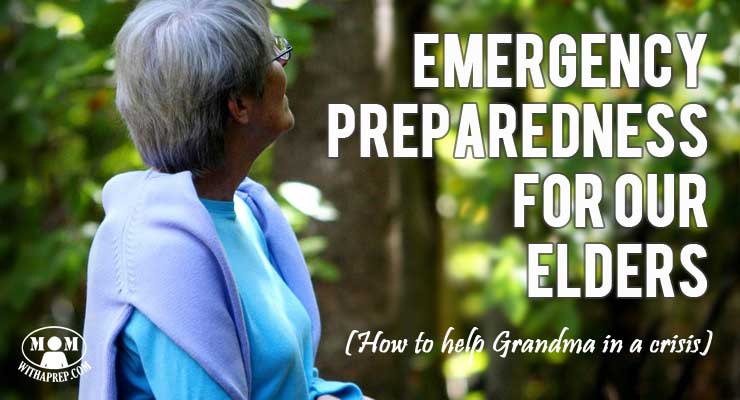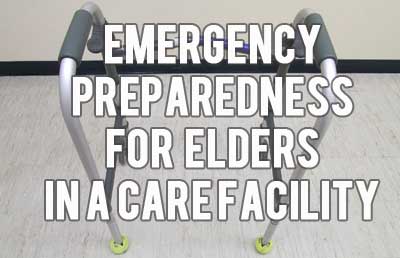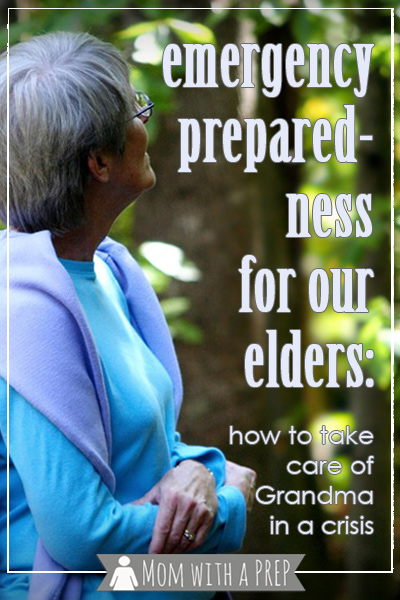Emergency preparedness for elders is an often forgotten subject – have you prepared to help Grandma in a crisis?
Not only do we need to prepare for our families at home, but we need to make sure that Grandma is taken care of, too! Do you have an emergency plan for elderly loved ones that may live alone, with you, or in assisted care facilities? Being the primary caretaker of an elderly or disabled family member is an awesome and somber responsibility, especially in light of emergency preparedness.

After having taken care of my grandmother for over five years, I’d like to share some ideas about how you can begin to adjust your emergency plans for a loved one who may have special considerations for age, mobility or mental capacities. These are suggestions, only. I am not a doctor nor a licensed care giver, and you’ll want to check with your own care team for suggestions as well.
EMERGENCY PREPAREDNESS FOR ELDERS TIPS
In her home
• Safety Numbers – make sure Grandma had a list of emergency numbers she can call, posted in an obvious place. In an emergency, it is easy to be confused, and making a short, easy to read list, handy in the place she knows where to go will help her tremendously. Only include a few numbers to cut down on the change of confusion by too many numbers. Sometimes, confusion will cause Grandma to shut down completely and not seek help at all.
You may also consider a monitoring system for her in case of falls, too.
• Find Good Neighbors – if you can’t live by your elderly loved one, check her neighbors to connect with them and have them do safety checks for you. Just have them stop by to stay hi, check on her when bad weather is coming or has come, if the temperatures drop too much or are too high, etc. If you don’t trust her neighbors, you can get a local house of worship that she associates with to check in on her occasionally as well. Some cities also have senior centers who may have volunteers who perform these kind of tasks as well.
• Emergency Wellness Checks – In some cases, local emergency response teams will do wellness checks on at risk individuals. So if you haven’t heard from Grandma in a few days, a police or fire rescue team from the area will check in on her for you. Check with local authorities for details.
• Meals on Wheels – If your elderly loved one cannot cook for themselves or leave their home easily, consider setting them up with the Meals on Wheels program. Not only will MOW deliver a hot lunch almost daily, in the even of inclement weather, MOW will often stock them up with easy meals to last a few days until the weather clears.
• Emergency Lighting – one of the largest occurrences of injury in elders is falling. In an emergency, if there is inadequate lighting from a power outage or large storm, she’ll need more light not to fall in her home. Make sure you have some emergency lighting like these Blackout Buddies from the American Red Cross. They plug in to an outlet, can be taken out to use around the room, and give her light around her home.
• Water -Keeping our loved one properly hydrated is essential.. Provide lots of backup water that is EASY to open, easy to maneuver and easy to get to. If you stock a section of her fridge with pre-opened water bottles, that gives her a few extra days of water in the event of water outage during a localized disaster. Do not stock large bottles of water or pouches that are too hard to open.
• Food – Another issue with making sure our seniors are well nourished is food that is easily accessible, easy to get to, and palatable to eat without heat. We stocked nutrition shakes which made a world of difference for us in our situation. Pop top cans may not be great for long-term storage in your deep pantry, but perfect for an easy open container for her pantry.
In your home
- Emergency Bag – make sure Grandma has a 72 hour kit with supplies specifically for her needs (dietary supplements, medical needs, incontinence supplies, glasses, hearing aids and batteries, monitors, oxygen, extra walker or cane, etc.) Mostly likely, you or another family member will be carrying it if you have to leave, but you should have it stored in your home, nonetheless. You can find a DIY 72 hour kit checklist here.
- Comfort items – make sure, in your checklist, you allow for grabbing Grandma’s favorite sweater or family photo. You’d be surprised at how quickly her mental status can fall when they become scared and overwhelmed. A comfort item can give her a focus and something that makes her feel somewhat safe.
- Safe Passage – Clear a path to sure that whatever exit strategy you have for Grandma gives you and she a safe passage without crawling over, through or around things. Try to make her exit the easiest exit possible for your situation. You can tape a map to the wall if the visual will help
- Emergency exit – If Grandma is completely immobile, make sure your plans include a quick way to get her out of the house – whether it’s to knock out a window/sliding glass door to get a bed out, extra sling to help carry her to safety with other family members or neighbors
- Consider a bug-in plan that allows for safety of your family and support for Grandma.
- Backup generator for Grandma if she needs to sustain medical equipment. Talk to your doctor, local fire department and elderly care facilities to find out best ways to ensure long-term power outage situations.
- First Aid/CPR – know that in this situation, unlike others, the mere situation may cause need for first aid because Grandma is already in some physical distress and an emergent need because of her health. Having first aid knowledge is a huge bonus in these situations (as in all, but this is a unique situation), to be able to assess and quickly treat those issues that arise.
- Have an updated list of medications handy in case you have to call for replacement meds. Be prepared for a localized natural disaster by calling ahead to get an extra supply stocked (such as in the case of a hurricane).

In a Care Facility
This is a harder situation for families. You cannot create a complete safety net at a long-term facility for Grandma because it’s impossible. Supplies that you tuck there may disappear, staff may not be able to follow your guidelines because of state regulations, etc. Of course, if Grandma is in an Assisted Living facility, options to store supplies is much easier. But you can prepare as much as possible given Grandma’s particular situation including:
- Make sure the facility has well thought out, recorded, and state-approved emergency response guidelines. This includes the guidelines they have for hurricanes, tornadoes, fire, evacuation, etc.
- Don’t interfere with the facility in common emergency situations. They’ve practiced, they know what they are doing, and if you trust them to take care of Grandma, trust them to handle an emergency situation. If you’ve done your research and know they have a good plan, go with it.
- Have your emergency contact information on file with both the office and the nurses station as well as in Grandma’s room.
- Have a pack at home for you to grab and go in an emergency that you can use one you’ve reached the facility to help Grandma in any way you can.
- Have backup gear in your vehicle for things like walkers, canes, and have her emergency bag ready.
- Keep a locked bag of luggage in her personal storage area (closet, etc.) with items that you would need if you could get to the facility in a time of crisis. This may contain extra eyeglasses, equipment, and things that you know are needed for backup. It could be her get out bag, or if leaving without the aid of facility personal is impossible, it can be your bug-in bag until a plan can be implemented.
- Make sure to have all-season clothing and shoes available at all times of the year for Grandma to wear in case evacuation is necessary.
- Have a meet up plan with the facility in case evacuation does happen and you know where they plan on taking Grandma. They may transfer her, temporarily, to another facility and you don’t want to lose contact on where she has been taken.
- Be sure to have an updated medical record available (medications she is taking, treatment plans, etc.) available so that any interim medical staff will know how to treat her. If you have a chance to get to her before an evacuation, it would be a good idea to keep a copy with her in case you are separated.
Know that Grandma will probably be scared and confused. Do the best you can to help calm and reassure her. Be realistic about the situation and what will be feasible for you to accomplish, and what won’t so you can make the safest decisions you can make to keep you, your family and Grandma as safe as possible.
I want to thank The Patriot Nurse for making this video for me to speak to this very issue.
More information on Emergency Preparedness for Senior Citizens:
- Preparing for Seniors from Ready.gov (pdf)
- American Red Cross
- Senior Citizen’s Guide
- Preparedness for those with mobility challenges
If you have tips on things to do to prepare for Grandma, please share!
NOTE: I am not a doctor or nurse. This article is not meant to replace proper medical advice in any manner. Please speak to your physician for medical plans for you and your Grandma. These are meant to be suggestions about her safety and protection during a crisis, not a medical intervention.
Katy Willis is a writer, lifelong homesteader, and master herbalist, master gardener, and canine nutritionist. Katy is a preparedness expert and modern homesteader practicing everyday preparedness, sustainability, and a holistic lifestyle.
She knows how important it is to be prepared for whatever life throws at you, because you just never know what's coming. And preparedness helps you give your family the best chance to thrive in any situation.
Katy is passionate about living naturally, growing food, keeping livestock, foraging, and making and using herbal remedies. Katy is an experienced herbalist and a member of the CMA (Complementary Medical Association).
Her preparedness skills go beyond just being "ready", she's ready to survive the initial disaster, and thrive afterward, too. She grows 100% organic food on roughly 15 acres and raises goats, chickens, and ducks. She also lovingly tends her orchard, where she grows many different fruit trees. And, because she likes to know exactly what she's feeding her family, she's a seasoned from-scratch cook and gluten-free baker.
Katy teaches foraging and environmental education classes, too, including self-sufficient living, modern homesteading, seed saving, and organic vegetable gardening.
Katy helps others learn forgotten skills, including basic survival skills and self-reliance.
She's been published on sites such as MSN, Angi, Home Advisor, Family Handyman, Wealth of Geeks, Readers Digest, and more.

